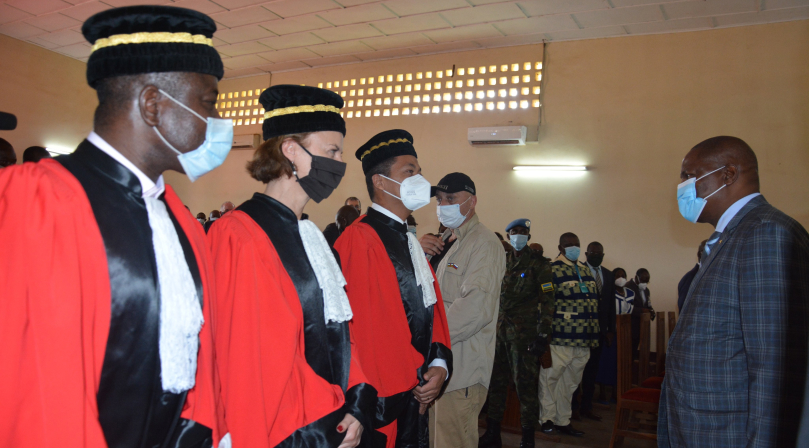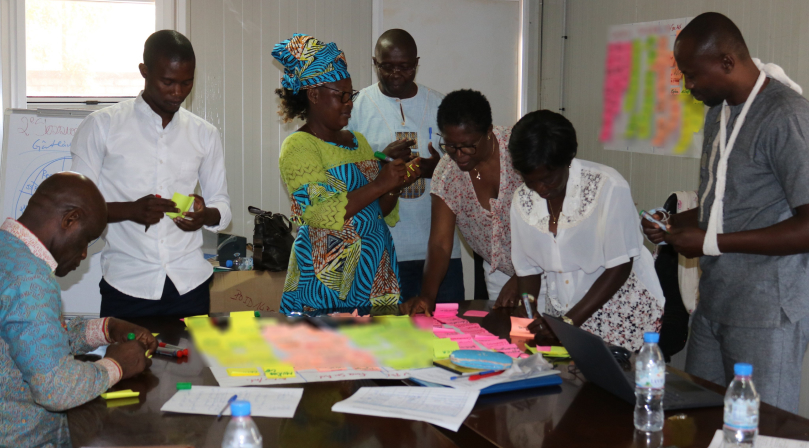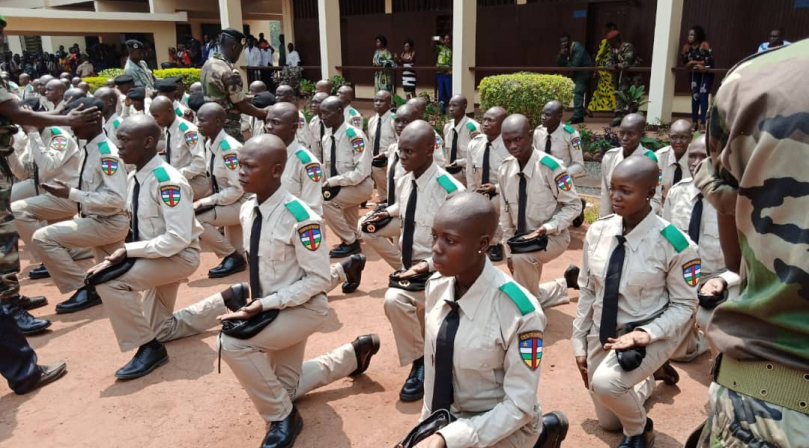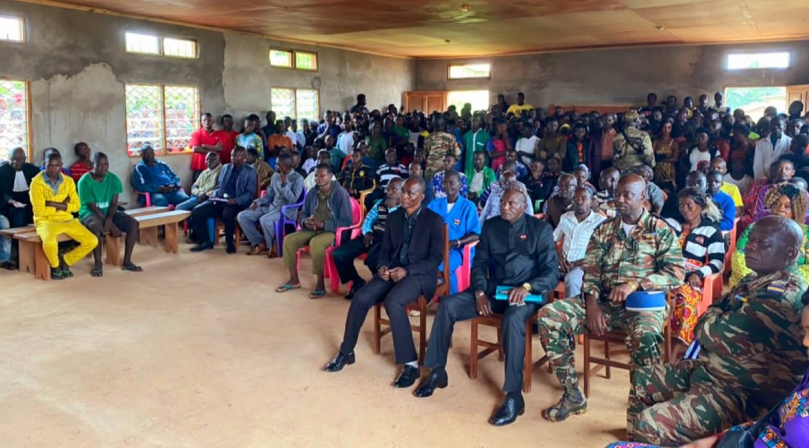Impact by Regions, Countries & Territories
UNDP’s Global Programme supports crisis-affected contexts across all regions to strengthen the rule of law and human rights. In this section, we present five regional overviews, detailing our priorities and approach depending on the context, as well as feature select country and territory results from 2021.
Five contexts from the list (Central African Republic, Democratic Republic of the Congo, Haiti, Mali and Yemen) illustrate the achievements of the Global Focal Point for the Rule of Law (GFP). In peacekeeping missions and transition settings, UNDP’s Global Programme works through the GFP to deliver integrated assistance with our UN partners.
GFP Global Focal Point Highlights
Political
Engagement
The rule of law is essential for sustainable peace and resilient economies, as well as for the prevention or recurrence of conflict. To prevent or address injustice, inequalities or democratic deficits, UNDP works with multiple stakeholders to operate in a way that is consistent with the rule of law and creates opportunities for all individuals to exercise their rights and access justice.
Institution
Building
The importance of strong institutions is more evident than ever as countries and communities respond to disruption, whether because of public health restrictions, climate change or political upheaval. Limitations on public gatherings and travel have revealed the need for institutions that are resilient to disruption.
Community
Security
2021 was a pivotal year that saw various developments affecting peace and security around the world. Civic space continued to shrink and the social contract between states and citizens was increasingly challenged, particularly during and after the response to the COVID-19 pandemic. Facing distressing consequences of climate change, states and communities are forced to manage more cross-border conflicts, triggered by the displacement of people seeking increasingly scarce resources.
Human Rights
Systems
The scope of human rights challenges is widening, from eroded public trust and shrinking civic space to ongoing inequality and human rights impacts in the socio-economic repercussions of the COVID-19 pandemic, and emerging risks in the digital sphere. National human rights institutions (NHRIs), along with other human rights defenders, are facing rising and sophisticated forms of reprisals for carrying out their work.
Access to
Justice
Sustainable Development Goal 16 (Peace, Justice and Strong Institutions) of the 2030 Agenda highlights the importance of access to justice for all for the development of peaceful and inclusive societies. Meaningful access to justice can only be achieved when people know their rights, have the opportunities, agency and capacities to claim them, and have access to independent, inclusive and people-centred justice systems that will respond in a timely, fair and effective manner.
Transitional
Justice
Without justice, there can be no lasting peace. In post-conflict, crisis-affected and fragile contexts, truth-seeking initiatives and reconciliation efforts are essential to bring peace to affected communities. The COVID-19 pandemic has slowed down transitional processes as states prioritized their response to the health crisis and measures to support the economy.
Gender
Justice
In 2021, the continued erosion of democracy and the spread of authoritarian trends in politics in many parts of the world contributed to a backlash against women’s rights. The COVID-19 crisis has reversed some of the hard-won gender parity gains by exacerbating pre-existing inequalities and power imbalances. It has also caused a dramatic increase in sexual and gender-based violence (SGBV). All these challenges have been particularly acute in conflict, fragile and crisis-affected settings.
Innovation
New ideas and new strategies are critical to building sustainable and effective development approaches that really meet people’s needs. Technologies and globalization raise new human rights concerns and threaten the rule of law. Responses to the COVID-19 pandemic continue to limit people’s access to basic services. UNDP connected expertise across the globe to learn and adapt. Creating a culture of curiosity and experimentation, these efforts ensured that local needs and expertise were combined with emerging models to bring strategic thinking to people-centred development goals.

CAR
In the Central African Republic, 2021 was marked with violence and instability due to the presidential elections in December 2020. The turmoil continued until the second round of the elections took place and the new Government was appointed in June 2021, with major impacts on the population and the rule of law sector. Security and judicial personnel in the regions fled to Bangui, the capital, and prisons, police stations and courts were looted. UNDP’s strong partnership with national authorities allowed it to modify its programme in order to mitigate the impact of the crisis and continue providing support to justice and security sector reforms.
The year 2021 marked the beginning of the portfolio approach to people-centred and integrated rule of law assistance, bringing together all joint Rule of Law projects implemented by UNDP with the United Nations Multidimensional Integrated Stabilization Mission in the Central African Republic (MINUSCA), UN Women and the Team of Experts on Sexual Violence in Conflict under the Global Focal Point (GFP) umbrella on advocacy and the provision of technical, operational and financial support.
In this context, UNDP continues to play its role of a convener and integrator between national authorities from both the security and justice sectors, different UN entities, international partners and civil society organizations (CSOs).
In 2021, major milestones were achieved in strengthening transitional justice and the fight against impunity. The first public hearing of the Special Criminal Court (SCC) was held in December 2021 on the case of the massacres in Koundjili and Lemouna in 2019. Moreover, the 11 Commissioners of the long-awaited Truth, Justice, Reconciliation and Reparation Commission (TJRRC), including five women, took their oath in July. UNDP and partners provided extensive technical, expert and advocacy support to the Commission that began to implement its four-year mandate. In partnership with the International Center for Transitional Justice, UNDP engaged commissioners and peers from other countries such as Côte d’Ivoire, Mali, Peru, The Gambia, Togo and Tunisia to participate in the first strategic retreat of the Commission, and supported the design of its strategy, internal procedures and its first meetings with victims, civil society and the media.
According to a perception survey, 60 percent of the population view the SCC, and 57 percent view the TJRRC, as indispensable for durable peace. Additionally, 54 percent of respondents stated that ensuring accountability for perpetrators is a prerequisite for peace.
Central Africans plea for justice



To make formal justice visible and accessible, mobile courts supported by UNDP held eight hearings in the jurisdictions of Berberati, Nola and Carnot.
UNDP contributed to the restoration and strengthened capacity of the rule of law institutions in CAR: 1) 300 prison officers began or completed their internship in prisons across the country; 2) the National Judicial Academy (ENAM) recruited 60 magistrates and 40 clerks to begin their initial training in 2022; 3) preparations were completed to launch the training of the first certified judicial police officers (OPJ); 4) Internal Security Forces (ISF) received communications tools and were redeployed to five cities. To support the ISF in implementing community policing, UNDP enabled 11 training sessions throughout the country for 274 police officers and gendarmes. At the central level, UNDP supported the development and installation of Human Resources Management Software for the police and the gendarmerie, as well as the training of personnel for more effective management of the security forces.
In parallel, UNDP prioritized support to the civil society-led legal aid clinics that remained open throughout the crisis to offer services to victims at the community level. Through the legal clinics managed by the Association of Women Jurists (AFJC), 11,431 people, including 9,602 women, benefited from legal aid services and psychosocial support. Twenty-four training sessions were conducted in eight localities for 420 community leaders (including 190 women) on access to justice, in partnership with the non-governmental organization “Network for Human Rights”.




Since its inception in 2017, the specialized police unit on sexual violence (UMIRR) has filed over 2,000 cases of sexual and gender-based violence (SGBV) to the Bangui, Bimbo, Kaga-Bandoro, Bossangoa, and Mbaiki prosecutors' offices. Over 8,000 survivors have benefited from UMIRR’s services.
Looking forward, UNDP will continue support so that the Special Criminal Court and the Truth, Justice, Reconciliation and Reparation Commission are able to function independently and effectively. The overall aim in accompanying these justice mechanisms remains to address the justice needs of Central Africans, in particular their demands for the fight against impunity, truth-seeking and reconciliation. In parallel, UNDP will continue to promote its people-centred approach to security sector reform to prevent new outbreaks of human rights violations and conflict-related sexual violence, and to break the cycle of violence and fragility.
- 4 Vinck P, and others, Peace Justice and Security Polls, Report 6 (2021), , 2021, Harvard Humanitarian Initiative, UNDP and MINUSCA, available at http://www.peacebuildingdata.org/sites/m/pdf/CAR_Poll6_ENG.pdf; also see interactive map per indicator at http://www.peacebuildingdata.org/kmaps/maps/car06/#/
Key Results: Central African Republic
237 complaints filed with the Special Criminal Court. 305 victims and witnesses, including 24 women, benefitted from the SCC protection measures, and the first public hearing was held.
11 Commissioners of the Truth, Justice, Reconciliation and Reparation Commission, including five women, took their oath for a four-year mandate
276 police officers and gendarmes were trained on community policing and people-centred security. 300 prison personnel finalized or began their internships. 60 judges and 40 clerks were recruited for their initial training.
11,431 people, including 9,602 women, benefited from legal aid services in nine legal clinics managed by the Association of Women Jurists (AFJC). Over 8,000 victims benefited from legal and psychosocial services of the specialized police unit on sexual violence.
